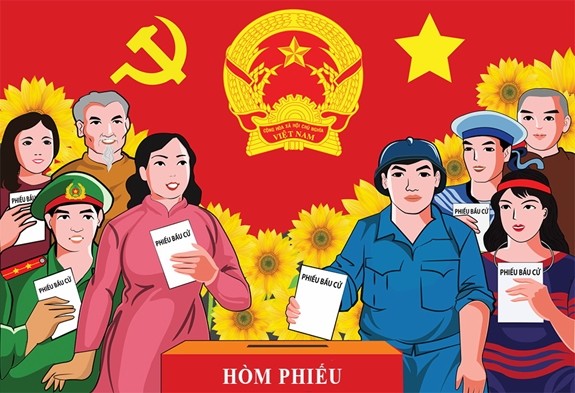(VOVWORLD) - There are campaigns on social networks trying to persuade voters not to vote in the elections on May 23 for the 15th National Assembly and People's Councils of the 2021-2026 term. Vietnamese citizens understand, however, that voting is their sacred right and duty. The Vietnamese people struggled for thousands of years and sacrificed countless lives to acquire this right.
 A poster of people casting ballots A poster of people casting ballots |
The right to vote is defined by the Constitution and Vietnamese law as the ability of citizens to choose people to represent them in state agencies. This right includes nominating people to stand for the election and voting, which is making a proactive choice. Through elections, voters choose people to represent them in exercising state power and participating in the state apparatus.
Before 1945, Vietnam didn’t have a Constitution or elections of a National Assembly and People’s Councils. The success of the August Revolution in 1945 under the leadership of the Communist Party of Vietnam led by President Ho Chi Minh gave the Vietnamese people many rights they never had before, including the right to vote.
Vietnam’s first Constitution, adopted by the 1st National Assembly of the then Democratic Republic of Vietnam on November 9, 1946, confirmed citizens’ right to vote in Article 18, which said: “All Vietnamese citizens aged 18 and above, irrespective of gender, have the right to vote, except insane persons and those deprived of civil rights. Candidates for election must be persons who have the right to vote, are at least 21 years of age, and know how to read and write the national language. Citizens serving in the Army also have the right to vote and to stand as candidates for election.”
Three later Constitutions, adopted in 1959, 1980, and 1992, confirmed the right to nominate and vote for representatives. Article 27 of the latest Constitution, adopted in 2013, says: “Citizens shall, upon reaching the age of 18, have the right to vote and, upon reaching the age of 21, have the right to stand for election to the National Assembly and People's Councils. Legal exercise of these rights is provided by statute.”
Vietnam has always promoted the people’s right to mastery. The right to choose representatives is an important civil right that carries a corresponding responsibility and duty. Encouraging voters not to vote is an attack on this sacred right and duty.
Elections of the National Assembly and People’s Councils at all levels have been shown to be democratic and fair and an indispensable part of Vietnam’s history, culture, politics and global advancement.
Vietnamese election laws, from the establishment of the Democratic Republic of Vietnam until today’s Socialist Republic of Vietnam, have specified that elections of the National Assembly and People’s Councils shall be conducted on the principles of universal suffrage, equality, direct voting, and secret ballot. These principles, globally accepted and approved, ensure proportional representation of localities. Citizens vote directly for the people who will represent them at legislative bodies from the National Assembly down to grassroots level.
Vietnam has 53 ethnic minority groups. The Vietnamese Party and State have always protected the rights of all these groups. Current election law specifies that: “The number of ethnics who are nominated National Assembly candidates shall be proposed by the National Assembly’s Standing Committee at the request of the National Assembly's Ethnic Council, provided that at least 18% of total official National Assembly candidates are ethnics.”
In practice, the number of ethnic minority deputies has always exceeded the ethnic minority proportion of Vietnam’s population. In the 11th tenure, ethnic minority deputies accounted for 17.2%, and in the 14th tenure 17.3%. Vietnam’s 53 ethnic minority groups (excluding the Kinh majority) comprise only about 15% of the total population.
The Law on the Election of Deputies to the National Assembly and People’s Councils says: “The number of women who are nominated National Assembly candidates shall be proposed by the National Assembly’s Standing Committee at the request of the Presidium of the Central Committee of the Vietnam Women's Union, provided that at least 35% of total official National Assembly candidates are women.”
Vietnam is a nation of the people, by the people, and for the people. People organize the State by electing State agencies. All Vietnamese citizens understand that voting is a sacred right and duty. Misguided arguments that they should refrain from exercising this right are unlikely to affect the national elections on May 23.